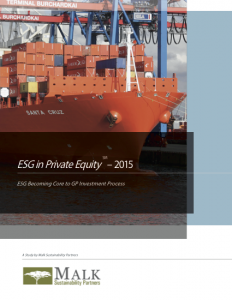In ESG in Private EquitySM – 2015, MSP draws on the primary responses from more than 70 private equity general partners (GPs) and limited partners (LPs), pushing beyond established answers to seek deeper insight about the state and future of ESG management and, furthermore, how it aligns with broader trends in private equity today.
The study is MSP’s fourth publication in its ESG in Private EquitySM series and a return to MSP’s state-of-the-market report.
[accordion clicktoclose=true] [accordion-item title=”Today in Private Equity”]Diligence more important since all deals are a “can’t miss”
A vast increase in dry powder coupled with attractive debt opportunities and strong public equities markets has led to a surge in competition for private equity buyout deals. With that competition, firms are often paying a price premium to secure a deal, which means a portfolio company tanking hurts even more. To mitigate that risk, firms are stepping up all aspects of due diligence, including ESG due diligence.
Internal Recognition of ESG value
From ESG in Private EquitySM – 2013 to today, we found that a majority of firms now recognize ESG risks and opportunities as material to a portfolio company’s value. While many firms still pursue ESG management in response to LP expectations, a growing number do so because they recognize the impact ESG can have on protecting and creating value.
Risk is becoming a leading driver of ESG management
Survey participants identified risk mitigation and its derivative, reputation preservation, as the top driver of ESG management. Increasing transparency around social and environmental issues, more stringent expectations from key customers, and the aforementioned buyout price premium all contribute to this trend.
ESG risk mitigation begins in due diligence
In response to the growing importance of ESG risk mitigation, a majority of firms surveyed include an ESG slide or summary in due diligence reviews of potential acquisitions. Additionally, 36% of firms surveyed include an ESG slide or summary in every review of potential acquisitions. These trends evidence the importance GPs give ESG issues, beginning in the due diligence process.
Board ESG risk monitoring now common
After diligence, a majority of firms also incorporate ESG risk monitoring into portfolio company board meetings. The incorporation into board meetings, a highly coveted time for GP-portfolio company interaction, demonstrates the impact that ESG can have on protecting and creating value. Furthermore, it shows the growing recognition among private equity firms of that impact.
More and more LPs set ESG expectations
In our survey of GPs and LPs, we found that a greater number and larger variety of LPs are increasing their ESG expectations of fund managers. While typically firms have found European LPs to be the main inquirers on ESG, that concern now extends to North American pension plans, LP consultants, foundations/endowments and many other types of investors. For certain LPs, ESG is now a key component of fund manager selection, with several GPs reporting that ESG formed a part of the “go/no-go” conversation.
Increasing informal communication, too
While these growing expectations have precipitated an increase in formal communication from LPs to GPs (DDQs, annual updates, etc.), they have also led to more informal communication. LPs use phone calls, emails, and even site visits as a method of checking up on whether GPs’ are fulfilling commitments.
Focus on capacity, not specific issues
In both the formal and informal communication between LPs and GPs on ESG, our survey participants overwhelmingly reported that LPs value GPs’ capacity to manage ESG; they don’t prescribe a method for managing specific issues.

